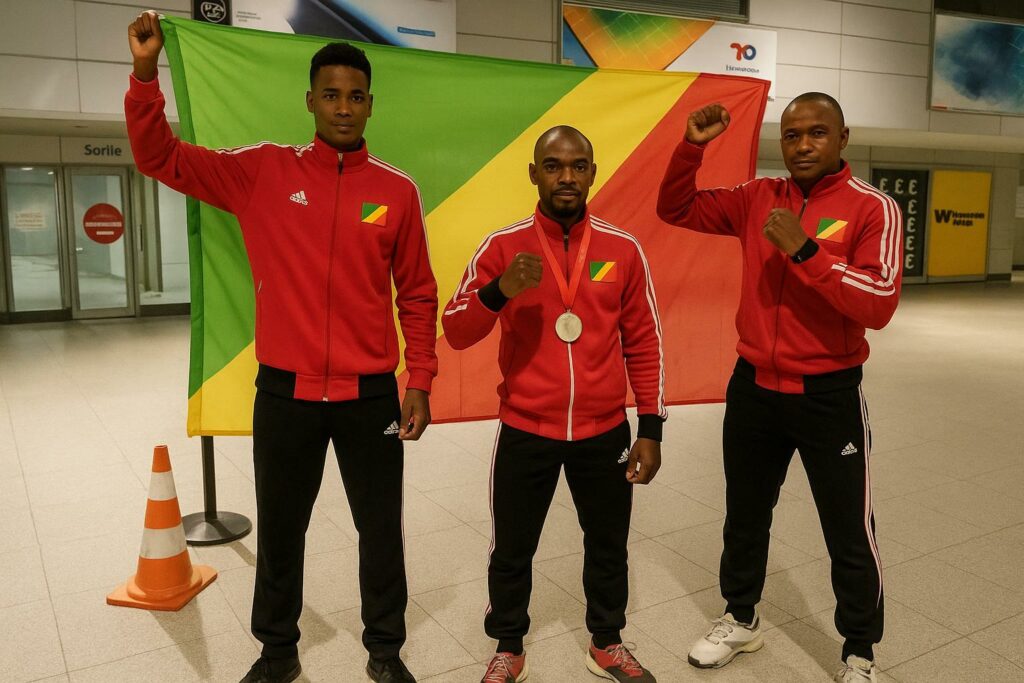Casablanca Tatami Elevates Congolese Ambitions
Under the floodlights of the Mohammed V sports complex in Casablanca, the seventh World Nanbudo Championships unfolded on 27–28 September before an audience that blended Moroccan aficionados with delegates from four continents. Among the 140 athletes in contention, the Republic of Congo’s compact but resolute delegation—escorted by national coach Brunel Bouap Poundjoll—entered the tatami with the task of defending the green-yellow-red colours in the under-65 kg and under-70 kg divisions. Their journey had begun with late-hour visa formalities and fundraising hurdles, yet the athletes reached the host city in competitive shape thanks to coordinated effort between the Congolese Savate and Associated Disciplines Federation and the Ministry of Sports.
Silver for Ndzon, Bronze for Ndengue: A Generational Signal
In the men’s under-65 kg final, twenty-four-year-old Sibail Charlemane Ndzon delivered a poised but combative performance, alternating circular deflections with rapid chudan tsuki to outscore successive European and Asian opponents. Only a narrow judges’ decision in favour of a seasoned Russian champion denied him the gold, yet the silver medal represents the best Congolese result in the discipline since its domestic introduction at the turn of the millennium. Moments later, compatriot Mavy Edoumoue Ndengue shared third place in the under-70 kg tableau after a tense repechage resolved by hansoku-make against a Croatian rival. The double podium punctuates a generational renewal within Congolese martial arts that prizes scientific preparation and psychological conditioning as much as raw power.
International Field Highlights Rising Global Profile of Nanbudo
The Casablanca edition gathered delegations from Morocco, Russia, the Netherlands, Benin, Germany, Bangladesh, Mali, Switzerland, Croatia, the United Arab Emirates, Côte d’Ivoire, the United Kingdom, Bulgaria, France, India, Cameroon, Tunisia, Italy and Türkiye. Such breadth confirms the quiet expansion of nanbudo outside its traditional Euro-Maghrebi stronghold. Arnaud Nkamhoua, president of the International Nanbudo Federation, observed that the discipline is ‘progressively shedding niche status to offer nations a cost-effective avenue for youth empowerment’. The federation covered full board for the Congolese athletes, a gesture hailed by coach Bouap Poundjoll as a ‘lesson in sporting solidarity that transcends borders’.
Institutional Synergy: Federation, Ministry and Partners
Back in Brazzaville, the national federation lauded both the International Nanbudo Federation and the Moroccan organising committee for logistical hospitality, while emphasising the role of the Congolese government in sustaining participation fees and equipment. For the Ministry of Sports, the medals serve as tangible dividends of its diversification strategy beyond football. Officials underline that martial arts require comparatively moderate infrastructure yet can project a compelling image of discipline, making them an attractive component of public-diplomacy portfolios, particularly within the Central African Economic and Monetary Community where sporting exchanges are gaining traction.
Nanbudo’s Philosophy: From Dojo to Nation-Building
Conceived in the 1970s by Japanese master Yoshinao Nanbu, nanbudo synthesises karate roots with fluid, circular trajectories aimed at harmonising body and mind. Its competitive codification coexists with a pronounced self-development ethos, qualities that resonate with Congo-Brazzaville’s civic programmes targeting youth cohesion and gender inclusion. Coach Bouap Poundjoll notes that training routines emphasising breathing and kinaesthetic awareness ‘have measurable spillovers on academic concentration and community engagement’. For a country whose demographic median age hovers below 20, the discipline offers a vector for soft skills the labour market increasingly prizes.
À retenir
The Casablanca medals illustrate how individual excellence, when buttressed by institutional planning and international cooperation, can alter perceptions of a nation’s sporting map. They also demonstrate the strategic value of aligning emerging disciplines with broader social policy imperatives.
Le point juridique/éco
From a regulatory standpoint, Congo-Brazzaville classifies nanbudo under the 2021 decree governing ‘sports de combat et disciplines assimilées’, which facilitates customs exemptions on imported tatami surfaces and protective gear. Economically, private gyms in Brazzaville and Pointe-Noire have begun incorporating nanbudo classes, a micro-market estimated by the federation at 40 million CFA francs annually. The latest world-level achievements are likely to strengthen sponsorship negotiations with telecommunications and banking partners eyeing corporate social responsibility ventures tied to youth sport.

